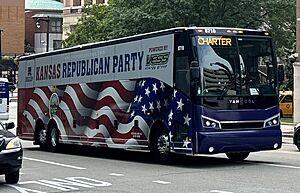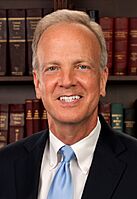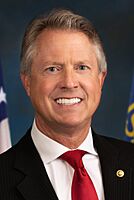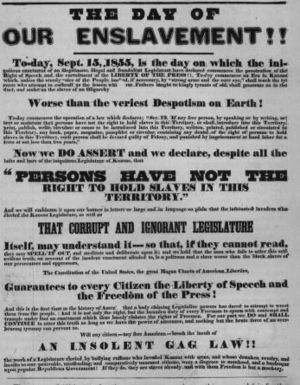Kansas Republican Party facts for kids
Quick facts for kids
Kansas Republican Party
|
|
|---|---|
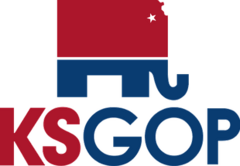 |
|
| Chairman | Danedri Herbert |
| Senate President | Ty Masterson |
| House Speaker | Daniel Hawkins |
| Founded | May 18, 1859 |
| Headquarters | 800 SW Jackson St., Suite 1300 Topeka, KS 66612 |
| Membership (2021) | |
| Ideology | Conservatism |
| National affiliation | Republican Party |
| Colors | Red (unofficial) |
| U.S. Senate seats |
2 / 2
|
| U.S. House seats |
3 / 4
|
| Statewide executive offices |
4 / 6
|
| Seats in the Kansas Senate |
31 / 40
|
| Seats in the Kansas House of Representatives |
88 / 125
|
| Election symbol | |
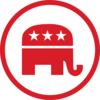 |
|
The Kansas Republican Party is the Kansas branch of the national Republican Party. It was started in May 1859, even before Kansas became a state.
The party is a major force in Kansas politics. Inside the party, there are different groups of people with slightly different ideas. Some are called moderates, and others are called conservatives. Moderates are often willing to work with the Democratic Party to pass laws. Because of this split, some people say Kansas has "three-party politics."
Today, the Republican Party is the main party in the state. Republicans hold both of Kansas's seats in the U.S. Senate and most of its seats in the U.S. House of Representatives. They also have large majorities in the Kansas Legislature. However, the offices of Governor and Lieutenant Governor are currently held by Democrats.
How the Party is Organized
The Kansas Republican Party has a structure to help it run smoothly and elect candidates. It is organized from the local level all the way up to the state level.
- Precincts: A precinct is a small voting area. Registered Republican voters in each precinct elect a committeeman and a committeewoman. These people are local party leaders.
- County Parties: Kansas has 105 counties, and each one has a Republican Party committee. The precinct leaders in a county get together to elect county party officers, like a chair and vice-chair. They help find and support Republican candidates for local offices.
- District Committees: Kansas is divided into four congressional districts. Delegates from the counties in each district meet to elect district leaders. These committees help choose candidates for the U.S. Congress.
- State Committee: This is the main governing body of the party in Kansas. It is made up of delegates from all four congressional districts, party leaders, and elected officials. The State Committee elects the state party's main officers, like the state chair.
Current Party Leaders
The main leaders of the Kansas Republican Party include:
- Chair: Danedri Herbert
- Vice-chair: Andrew Hooser
- Secretary: Amanda Schlyer
- Treasurer: Roger Lomshek
- National Committeewoman: Wendy Bingesser
- National Committeeman: Mark Kahrs
Other important leaders include the chairs of the four congressional districts and key elected officials like U.S. Senators and the Speaker of the Kansas House.
Current Republican Officeholders
Republicans hold many important elected positions in Kansas at both the national and state levels.
Members of Congress
U.S. Senate
Kansas is represented by two Republican senators in Washington, D.C.
-
Senior U.S. Senator Jerry Moran
-
Junior U.S. Senator Roger Marshall
U.S. House of Representatives
- KS-01: Tracey Mann
- KS-02: Derek Schmidt
- KS-04: Ron Estes
Statewide Offices
Republicans hold four of the six main executive offices for the state of Kansas.
- Secretary of State: Scott Schwab
- Attorney General: Kris Kobach
- State Treasurer: Steven Johnson
- Insurance Commissioner: Vicki Schmidt
State Legislature Leaders
Republicans hold the top leadership roles in both parts of the Kansas Legislature.
- President of the Senate: Ty Masterson
- Speaker of the House: Daniel Hawkins
Party History
The Kansas Republican Party has been the most powerful political party in the state for most of its history. Since Kansas became a state in 1861, it has had more Republican governors, U.S. senators, and state lawmakers than any other party.
The Beginning: Fighting Against Slavery
The Republican Party was created in Kansas because of the fight over slavery. In the 1850s, the Kansas–Nebraska Act let settlers in the Kansas Territory decide if it would be a "free state" (no slavery) or a "slave state." This led to a violent time known as Bleeding Kansas, as people on both sides rushed to the territory.
Anti-slavery settlers formed the "Free-State Party," which became the Kansas Republican Party in 1859. Famous people like Horace Greeley and future president Abraham Lincoln visited Kansas to support the new party. Kansas entered the United States as a free state in 1861, and its first governor and all of its first members of Congress were Republicans.
A Long Period of Power
For many years after the Civil War, Kansas was a strongly Republican state. Many Union veterans moved to Kansas and supported the party that had saved the Union and ended slavery. The party was also seen as supporting farmers and building railroads.
During this time, the party also supported ideas that were considered very progressive. For example, in the 1880s, the party supported giving women the right to vote. It also elected some of the first African-American officials in the country outside of the South.
The Populist Challenge
In the 1890s, a new political movement called the People's Party, or Populists, became very popular in Kansas. It was made up mostly of farmers who were struggling with debt and low crop prices. The Populists wanted big changes, like more government control of railroads and banks.
For about a decade, the Populists and Republicans fought for control of Kansas. The Populists won some major elections, including the governor's office and a U.S. Senate seat. But the Republican Party fought back and eventually regained power by the early 1900s.
The Progressive Era and Party Fights
In the early 20th century, the Republican Party itself was split into different groups. The "Standpatters" were the more traditional, established leaders. The "Progressives" were reformers who wanted to fight corruption and use government to solve problems.
These two groups fought for control of the party. Famous Kansas progressives included Governor Walter Stubbs and journalist William Allen White. This era led to many changes, like primary elections, which let voters choose candidates directly instead of party bosses.
The Great Depression and World War II
The Great Depression of the 1930s was a difficult time for Kansas and the Republican Party. Many people lost their jobs and farms. For a while, Democrats won more elections. But a Republican governor, Alf Landon, became famous for balancing the state's budget during this tough time. He was so well-known that he ran for president in 1936.
After World War II, Kansas returned to being a solidly Republican state. Another famous Kansan, Dwight D. Eisenhower, became a five-star general and was later elected president of the United States in 1952 and 1956.
Modern Times: Moderates vs. Conservatives
Since the 1960s, the main story of the Kansas Republican Party has been the competition between its moderate and conservative members.
- Moderates are often from cities and suburbs. They tend to be more willing to compromise with Democrats and may support more government funding for things like schools.
- Conservatives are often from rural areas. They usually want lower taxes, less government spending, and policies based on traditional values.
This friendly competition has shaped Kansas politics for decades. Sometimes, the moderates have more power, and at other times, the conservatives do. In the 2010s, the conservative wing of the party became very strong, led by Governor Sam Brownback. This led to major changes in state policy, including large tax cuts.
In recent years, the two groups have continued to compete for control of the party. This has led to exciting primary elections where Republicans from different wings of the party run against each other. Despite these internal debates, the Republican Party remains the most powerful political force in Kansas.
See also
 | Bayard Rustin |
 | Jeannette Carter |
 | Jeremiah A. Brown |


